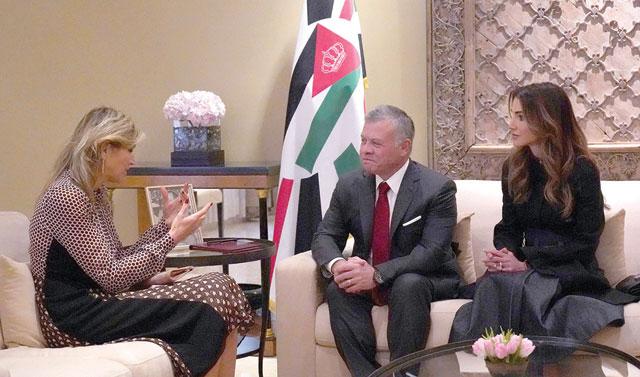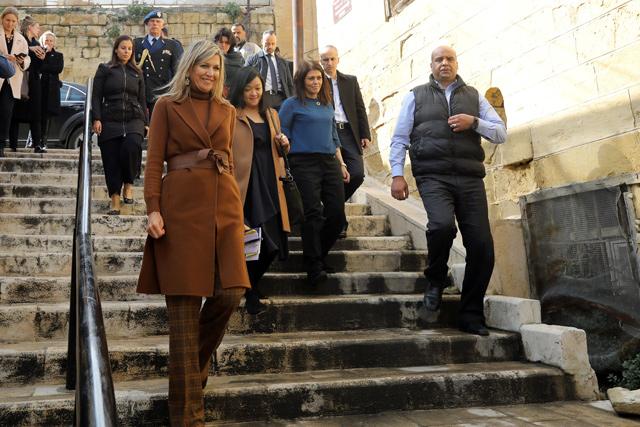You are here
UN ready to support Jordan’s financial inclusion plans
By JT - Feb 12,2019 - Last updated at Feb 12,2019

Their Majesties King Abdullah and Queen Rania meet with Queen Maxima of The Netherlands in Amman on Tuesday (Photo courtesy of the Royal Court)
AMMAN — His Majesty King Abdullah and Queen Rania on Tuesday met with Queen Maxima of The Netherlands, who was on a visit to the Kingdom in her capacity as the UN secretary general’s special advocate for inclusive finance for development.
His Majesty praised Queen Maxima’s relentless efforts in supporting comprehensive development in the world, according to a Royal Court statement.
Talks covered plans and programmes Jordan is implementing to stimulate economic growth and create more jobs, in addition to the procedures aimed at securing funds for the youth, women, entrepreneurs and funding small- and medium-sized enterprises.
They also discussed the London conference, scheduled for the end of February, which the UK will host in cooperation with the government to support the Jordanian economy.
Discussions also touched on the pressures imposed on the economy due to the Syrian refugee influx, with King Abdullah commending the support of The Netherlands and UN to Jordan, to enable it to deal with the repercussions of the eight-year crisis.
Adviser to His Majesty and Director of the Office of His Majesty Manar Dabbas, Minister of Planning and International Cooperation Mary Kawar and Dutch Ambassador to Jordan Barbara Joziasse attended the meeting.
Queen Maxima’s visit to the Kingdom is the first in her UN capacity. She met with several officials and private-sector representatives to discuss cooperation in e-finance services and means to support the implementation of the National Strategy for Financial Inclusion.
The queen started her visit on Sunday by meeting with several entrepreneur women in the Kingdom, where she had a first-hand look at their experiments in receiving the necessary funds to establish their projects.
Also on Tuesday, Queen Maxima met with Prime Minister Omar Razzaz and discussed the Kingdom’s national strategy for financial inclusion for 2018-2020, the Jordan News Agency, Petra, reported.
During the meeting, attended by Minister of Planning and International Cooperation Mary Qawar, Razzaz reviewed the measures taken by the government and the Central Bank of Jordan (CBJ) to enhance the process of financial inclusion and digitising the financial and payment systems to maximise their benefits.
Also on Tuesday, she met with ICT Minister Muthanna Gharaibeh, who thanked the queen and the UN for their efforts towards financial closure efforts.
For her part, the queen said that Jordan has an advanced ICT sector at the regional level, expressing the UN’s willingness to provide the necessary support for this sector as a vehicle of modern financial services, the Jordan News Agency, Petra, reported.
Queen Maxima also called on the CBJ, where she met with Governor Ziad Fariz and members of the steering and technical committee of the National Strategy for Financial Inclusion.
Fariz commended the queen’s efforts in supporting financial inclusion, stressing that her visit to the Kingdom at this phase is a recognition of Jordan’s efforts in this regard, Petra reported.
The governor referred to the achievements in the sector under the national strategy, including providing finances to SMEs, regulating the micro-finance sector, empowering women and protecting financial consumers.
He outlined the accomplishments realised in efforts to disseminate a sound financial culture, including, as a main pillar, an e-payment system in place through e-FAWATEER.com — an online bill payment service, payment through e-portfolios on mobile phones and efforts exerted through the CBJ’s organisational laboratory for innovation of financial technologies.
Fariz said that the CBJ seeks to address some challenges in the sector, such as low turnout on such services, risks of money laundering and cybersecurity threats, noting that these challenges can be addressed through legislation and technological solutions that can enhance security, speed and efficiency.
For her part, Queen Maxima praised the efforts exerted to promote financial inclusion and reach out to the targeted audience, in a way that reflects positively on the living conditions of these people.
She highlighted the importance of exerting more efforts to expand the base of e-financial services and to work on the e-payment system through mobile phones with the aim of increasing its efficiency and raise the number of users.
The UN special advocate also called for improving the infrastructure needed for the use of digital IDs to facilitate the opening of e-portfolios and bank accounts, and to focus on underprivileged segments, women and refugees.
She expressed her willingness to work jointly with the CBJ, in her UN capacity, offering to contact specialised organisations to provide the necessary technical support and know-how to expand the financial inclusion base and develop multiple financial services.
Queen Maxima stressed the importance of the visit to Jordan, which has a well-developed microfinance environment, due to its financial inclusion strategy that began in 2017 and included payment through mobile phones and enhancing financial literacy.
“Thirty-three per cent of Jordanians have access to financial services, which is low, but there is an effort to further increase this percentage,” she pointed out, adding that “there is still a lot to do, in light of the fact that 67 per cent of Jordanians are financially excluded”.
CBJ Governor Ziad Fariz said that the pioneering ideas of Queen Maxima have given forward momentum in the field of financial inclusion.
“We do not have payment and collection agents in Jordan, as highlighted by Queen Maxima,” he noted, stressing that work is under way to activate the mobile payment system “JoMoPay” and increase the number of agents working on the system.
He also said that the CBJ will work on enabling microfinance companies to provide a variety of services, along with loan provisions, to include insurance and remittances.
On digitisation, Fariz said that putting forward a model that will benefit the citizen, the service provider and the agent would require the government and the CBJ to cooperate with the UN, international institutions and the local private sector, adding that this would contribute to the accessibility of financial services to all, which would promote economic and social development.
Related Articles
AMMAN — Central Bank of Jordan (CBJ) Governor Ziad Fariz on Tuesday announced the Kingdom's 2018-2020 national strategy for financial inclus
AMMAN — Queen Maxima of The Netherlands on Wednesday wrapped up her four-day visit to the Kingdom where she met their Majesties King Abdulla
AMMAN — The Central Bank of Jordan (CBJ) has formed a committee to design a national strategy for financial inclusion in the Kingdom, in coo












